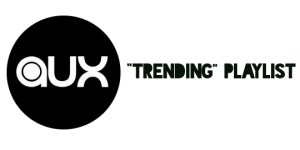Q&A: Death From Above 1979 talk 'The Physical World' and their cult following
by Juliette Jagger
September 9, 2014
Ten years after their explosive debut album, Death From Above 1979 get back together to release the high-stakes follow-up, 'The Physical World.'
It’s already been 10 years since Toronto’s Death From Above 1979 erupted from the city’s underground with their explosive debut album You’re A Woman, I’m A Machine. Packed with pounding dream beats and the kind of fervorous bass lines that sound like a hacksaw cutting through sheet metal, the album was 35 sweaty, libido-charged minutes of sarcastically delivered human desperation; in short, it was pure electricity.
Despite having only released one full-length album prior to their break-up a mere two years later in 2006, DFA’s rabid cult following has only continued to grow. When news of a long-awaited second album, The Physical World, broke in early 2014, it became clear that no love has been lost, and that not even a decade has lessened expectations for the follow up.
We spoke with Jesse F. Keeler (bass, synths, backing vocals) and Sebastien Grainger (vocals and drums) in Toronto recently to find out what prompted the pair to finally write a follow-up to 2004’s You’re A Woman, I’m A Machine, what it was like to work together again, and at what point they have to take a step back and watch the album take on a life of its own.
Photo from DFA 1979’s pop-up shop by Riley Taylor
AUX: You’re coming up on the release of your new album, The Physical World, on September 9. Where are you at in terms of headspace right now?
Sebastien Grainger: I’m happy to have it out because we’ve been sitting on it for a while now.
Jesse F. Keeler: You know, it’s like we’ve designed and built an apartment building and now the vacancy sign is up and people are finally moving in. It’s like now you can take a step back to watch and it’s great to see people enjoying the thing that you’ve built. That’s really the best way I can describe it, because once we’re done with it, everything that happens after the moment we say, ‘Okay, that’s it, it’s finished,’ is up to the fans. I mean, the songs are alive for us, but our involvement with it ends there, then it’s up to them.
What prompted the decision to put out a new record as Death From Above 1979 now, at what is possibly one of the most fragmented eras in Canadian rock music?
SG: Well to be honest, and this is not to be disparaging, but we’ve never really considered ourselves in the context of Canadian music. It’s always just been up and out, and out is everywhere, so I can’t say I’m observing Canadian music specifically, but I think as a whole, music to me is missing a component right now.
JFK: Well, let’s say rock music is missing a component because there is a lot of great Canadian techno and other types of music being made right now, and I’m very proud of a lot of those acts. At the same time, we know that there are awesome fucking rock bands playing here every day, and I’ve seen some recently, but yeah, in terms of the stuff that gets the recognition…
There really are a ton of great rock acts in Canada right now, but at the same time do you think it’s fair to say that most aren’t getting the type of recognition they arguably deserve?
JFK: Here’s the thing: no one really deserves anything. You still have to account for circumstances and luck and sometimes just the level of sacrifice involved. There are honestly so few tangible things that I could point out in terms of why it worked out for us and it doesn’t for so many other people. It’s like if someone asked me, “Who is a great guitarist?” I’d tell them to go down to Guitar Centre and wait. One of the best guitar players I’ve ever heard was some kid with a shaved head sitting in Song Bird, and I was just standing next to him thinking, ‘What the fuck is going on?’ At the same time, my dad always used to tell me that all the best players are just hanging out at a music store with no band, and he was right, because there are so many other things involved in getting to a place where people pay attention. Man, if we knew why that was, we could quit playing music all together and just start doing seminars on how to “make it” [laughs]. But I don’t think we’ll ever feel like we’ve made it.
I think if there is some sort of secret code though it’s that you have to feel continuously dissatisfied with things and always have a goal that is far beyond where you are at—it needs to be constantly changing. A lot of people get distracted by the initial success and think, “Oh look, somebody likes my music, we’re making it,” or “Look my song got played on the radio.” That’s all good, if you are satisfied by it, but I mean we’re now sitting here and we have a never-ending stream of goals that are beyond what we have done. Before we even finished this record, I was already thinking about all the things we could have done differently or that we should do on the next one.
Photo by Riley Taylor
How did you go about writing this new record? Was it at all like putting the first one together or a completely new thing?
SG: A little bit yeah. The first record started with some basic songs that Jesse wrote without any real intention of it becoming a bass and drum band. He just wrote these three or four songs, demoed them and had them on a CD, and we’d just drive around listening to them. At a certain point I was like, “We should do this, these songs are good and we should really play these.”
JFK: So, you were the instigator both times then, ’cause I would have just been content to let them sit there. [laughs]
SG: Yeah maybe, though I feel you were the instigator, but who knows. Maybe we light each other’s fires, baby. [laughs]
Anyways, this process started again with Jesse sending me some demos of a few songs, which got the ball rolling. Then we got a room together, started playing and writing together, so it was similar in that sense but also different in a lot of other ways.
How so?
SG: Well, when we made You’re A Woman I’m A Machine, I hadn’t recorded anything ever, so the first time I actually made a record was together with Jesse. He had made a bunch of records by that point though.
JFK: Yeah, but I hadn’t ever been so involved before then. With all the other music I’d recorded I just sat there kind of clueless going, “What does this do?” or “Can I turn this? Oh, maybe I should leave that alone. What’s a compressor do?” [laughs]
Tell me a bit about why you chose Dave Sardy to produce the new record. I know he’s worked with literally everyone from The Red Hot Chili Peppers to Oasis…
JFK: Yeah, and he’s worked with Slayer and Manson, LCD Soundsystem, The Walkmen, Hot Hot Heat…That’s really the reason why we wanted to work him.
SG: It’s hard for us to define what we do and how we sound, and when we were looking for a producer, I didn’t know who Dave Sardy was until Jesse said, “It’s gotta be this guy.” Then I took a look at his credentials and they are absolutely crazy. I just felt like we’ve gotta be in there somewhere, you know? Like if you spread our stuff out across this list, we’d fit somewhere in the mix. When I listen to Dave’s songs, they just sound so great to me—the drums, the vocals, everything—so it was really like, “We need that guy”—the guy who knows how to do all these crazy things with all these different bands.
JFK: Yeah, and also I just really wanted to know if our band could sound that good. I had never thought about stuff like that before. Previously, the attitude we both had about recording was very much… not lo-fi, but our considerations were just different. Before we really only thought about the thing that we were doing. Contextual things were not thought about so much.
Can you tell me a bit about what Dave brought to the process of making this record?
JFK: You know it’s funny, I have this very clear memory of Dave saying to me: “Jesse, you’re a very good bass player. Can you not sound like a very good bass player please? Can you try not to showoff and just play these parts?” Of course at the time my reflexive reaction was to say: “Well fuck you because in my head that’s what I’m doing,” [laughs] but he was just trying to get me to make it sound easy. Of course making something sound easy is actually hard.
I mean Dave once asked Sebastien, “Where is that guy that sang on the last record?” To which I wanted to say: “He’s fucking sitting right there! He’s doing it and he’s the exact same guy.” But again, Dave was just trying to push us in a mental way; it wasn’t so much about what we were doing as it was about getting our heads in the right place while we were doing it. Of course because he is a man telling two other grown men that don’t like to be told what to do, what to do, we had to pause and say: “Oh that’s right we paid him to do that.”
That’s the interesting thing about the role of the producer though isn’t it? Although you hire them to do just that, they have such a difficult job in terms of drawing the best out of you, particularly when your best lies just beyond your comfort zone.
SG: Oh, Dave did lots of stuff we didn’t hire him to do. [laughs] In the end that was a good thing, but during the process it can be difficult. Dave knows that though, sometimes he would do something and say: “Oh man, you are going to hate me so much but…” That being said, we asked a lot of him too. Sometimes we had to say, “Hey, sorry Dave, but we’ve gotta re-record that whole song cause the drums don’t sound good or it’s too slow.” It can be easy for a producer to say, “We’ll just speed it up in Pro Tools,” but we’d be like “No, no, no we gotta do that again.” We didn’t want this one to be a Pro Tools record.
When you released You’re A Woman, I’m A Machine back in 2004, you kind of just erupted out of nowhere with this explosive record that really resonated with people in Toronto in a major way. As a result of that, I think a lot of fans have always felt what is almost a strange sense of ownership when it comes to you guys…
SG: I will not be owned! [laughs]
JFK: Remember my analogy about the apartment building? That’s exactly what I mean. You create this thing and you leave it there and people decide what to do with it on their own–that’s just how it is when you make a record.
SG: In a sense, we have a similar relationship to that record as the fans do, because we made it and put it out into the world where it just exists as separate from us. I mean it’s been all these years and that record has still survived without us, you know? Even though we’re the only people qualified to come in and make another one like it, I’m sure lots of people have listened to it and gone, “Well I can do something like that.” Whether that’s make records or paint pictures or whatever it is that they’ve been inspired to do, what’s great about it is that we are inspired by it as well.
Are you aware of that attachment that fans here in the city have to the band and to that record in particular?
SG: Yeah totally, but it’s not a stifling thing–we’re aware of it but we’re also really proud, and in a very dry, strictly economic sense, we created something that is desired and that people keep asking for, so it’s a successful thing. When you’re a musician or an artist, I think unless you have some sort of neurological problem, you want people to observe your music, you know? And we’ve been lucky that way.
JFK: Yeah, I think that we’ve been lucky to have people observe our music in our lifetime because there is all kinds of art that doesn’t get appreciated in the moment. There are so many records that we like now that apparently no one liked at the time, so we’re definitely fortunate in that sense.
Tags: Music, Cancon, Featured, Interviews, Death From Above 1979







